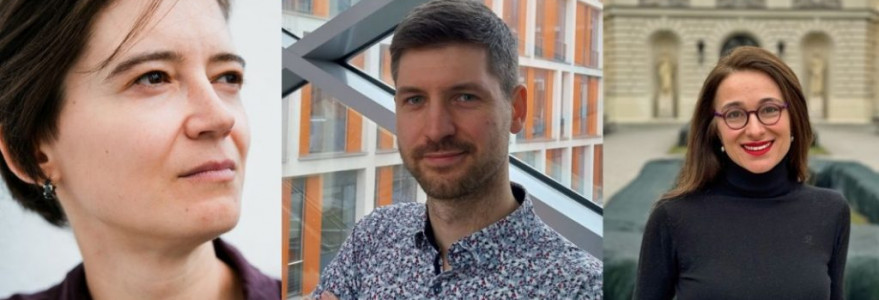Mobility of elites in the late Roman Empire and a new method of excitation of phonons will be the research topics of two grant holders who will carry out their postdoctoral fellowships at the University of Warsaw. The young researchers were awarded MSCA Postdoctoral Fellowships competition. Among the recipients is also Dr Katarzyna Wojnar from the Centre for European Regional and Local Studies, University of Warsaw , who will carry out her fellowship programme in Delft.
Dr Mariana Bodnaruk received a grant for the project entitled ” Mapping the Central Administration in the Later Roman Empire: The Epigraphic Representation and Elite Networks of the Palatine Bureaucracy.” The supervisor of the post-doctoral fellowship is Dr Paweł Nowakowski from the UW’s Faculty of History, who is conducting a team project on epigraphy, funded by an ERC Starting Grant.
The Late Roman Empire and the European Union
The researcher will analyse how the elites of the late Roman Empire used to build and maintain institutions that brought together many peoples and cultures – a structure in which some similarities can be seen with the European Union that emerged many centuries later, despite obvious yet sometimes drastic differences. The research aims at discovering what led to the emergence of bureaucratic mobility networks and how, despite regional differences, officials were able to build and maintain a trans-regional institutional framework.
Dr Mariana Bodnaruk will exploit the assumptions and findings of the digital humanities. In principle, she intends to create a digital map to visualise the network of the Empire’s elites and, thus, contribute to the development of epigraphical studies.
Digital humanities at UW
The University of Warsaw has a research data repository where not only publications but also information gathered during scientific works is collected. The repository is available at https://danebadawcze.uw.edu.pl/.
The UW’s Digital Competence Centre has created a website Humanistyka Cyfrowa na UW, which provides information on current digital humanities projects and events, primarily those involving teams or units of the University of Warsaw.
Both initiatives are funded by the “Excellence Initiative – Research University” programme (action I.3.6. “Humanistyka cyfrowa”).
Since 2021, at the UW’s Faculty of History, there is Interdisciplinary Digital Humanities Team and, since 2023, Digital History Lab headed by Dr Aleksandra Kuligowska. The lab organises “Cyfrowe czwartki” (ENG: Digital Thursdays) – meetings with researchers who carry out digital humanities projects.
Vibrations of phonons
Dr Michał Kobecki will carry out his project “Rezonansowe wzbudzanie fononów w nanostrukturach półprzewodnikowych z wykorzystaniem otwartej wnęki optycznej” at the UW’s Faculty of Physics. He is supervised by Prof. Piotr Kossacki from the same unit.
Phonons are quanta – tiny elements – of sound waves. They play an important role in solid state physics. High-frequency phonons are of importance primarily in quantum technology and nano-phonics. Their tiny wavelengths make them compatible with quantum nanodevices while their frequencies exceed modern computing speeds. Their major potential could allow phonons to find applications in quantum memories, hybrid systems and elements of quantum computing networks.
The research will be conducted with a novel experimental method. An optical cavity will be used to excite and detect phonons in semiconductor group II-VI materials. The method involves a series of steps using four resonances to increase the efficiency of phonon excitation.
The research will contribute to the knowledge of the performance of the high-frequency coherent phonon generation in II-VI semiconductor nanostructures.
More friendly cities
Dr Katarzyna Wojnar from the Centre for European Regional and Local Studies (EUROREG) also received a fellowship. The researcher will carry out the project “Resilience of coworking spaces” at the Faculty of Architecture of the Delpht University of Technology.
The aim of her research work is to investigate the factors that influence the resilience of coworking spaces in cities in the context of external crises. Dr Wojnar will focus on the needs and expectations of hybrid workers, and will use this knowledge to develop a prototype online platform to help optimise location strategies for workers.
The research will help to advance the design of more sustainable and smarter cities, and improve the quality of life and career choices for many people.
About the fellowship programme
Marie Skłodowska-Curie Action Postdoctoral Fellowships are awarded by the European Commission to individuals up to eight years after receiving their doctoral degree who have a significant scientific record.
More information about the programme is available on the European Commission website.



